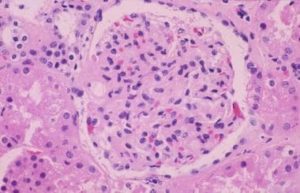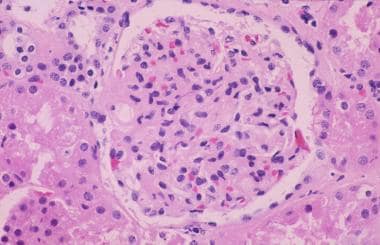In a recent study by Shen, 2023 patients with combined anti-GBM disease and IgA nephropathy were studied. They are both causes of glomerulonephritis.
Why is this important?
The combination of anti–glomerular basement membrane (GBM) disease and immunoglobulin A nephropathy (IgAN) is unusual but known to occur. Therefore Shen and colleagues studied such patients.
What did the study show?
Seventy-five consecutive patients with anti-GBM disease from March 2012 to March 2020 were examined. Amongst them, patients with IgAN on kidney biopsy were identified and enrolled.

Glomerulus showing IgA nephropathy.
Fifteen patients with combined anti-GBM disease and IgAN were identified, accounting for 20% (15/75) of all patients. Amongst them, nine were male and six were female, with an average age of 46.7 ± 17.3 years.
Thirty patients with classical anti-GBM disease (and no IgAN) were enrolled as controls (patients to be compared to), with 10 males and 20 females at an average age of 45.4 ± 15.3 years.
Patients with combined anti-GBM disease and IgAN had less kidney damage without pulmonary haemorrhage (which is normal in anti-GBM disease).
Compared with classical patients, anti-GBM patients with IgAN presented with significantly lower levels of serum creatinine on diagnosis (6.2 ± 2.9 vs 9.5 ± 5.4 mg/dL), and less likelihood of oliguria/anuria (20% vs 57%), but more protein in the urine.
Significantly less anti-GBM patients with IgAN ended up on dialysis (ESRD: 47% vs 80%).
Conclusion. Anti-GBM disease with IgAN not rare in anti-GBM disease. Patients with anti-GBM and IgAN recovered better after immunosuppression, and had better long-term outcomes.
How does this affect you?
Unless you have anti-GBM disease (with or without IgA nephropathy), it does not. But if you acquire the disease, it is useful to know the combination of anti-GBM disease with IgA nephropathy seems to be a milder disease than ‘classical’ anti-GBM disease without IgA nephropathy.
Other resource
CKDEx has more information on IgA nephropathy.
Last Reviewed on 26 June 2024

